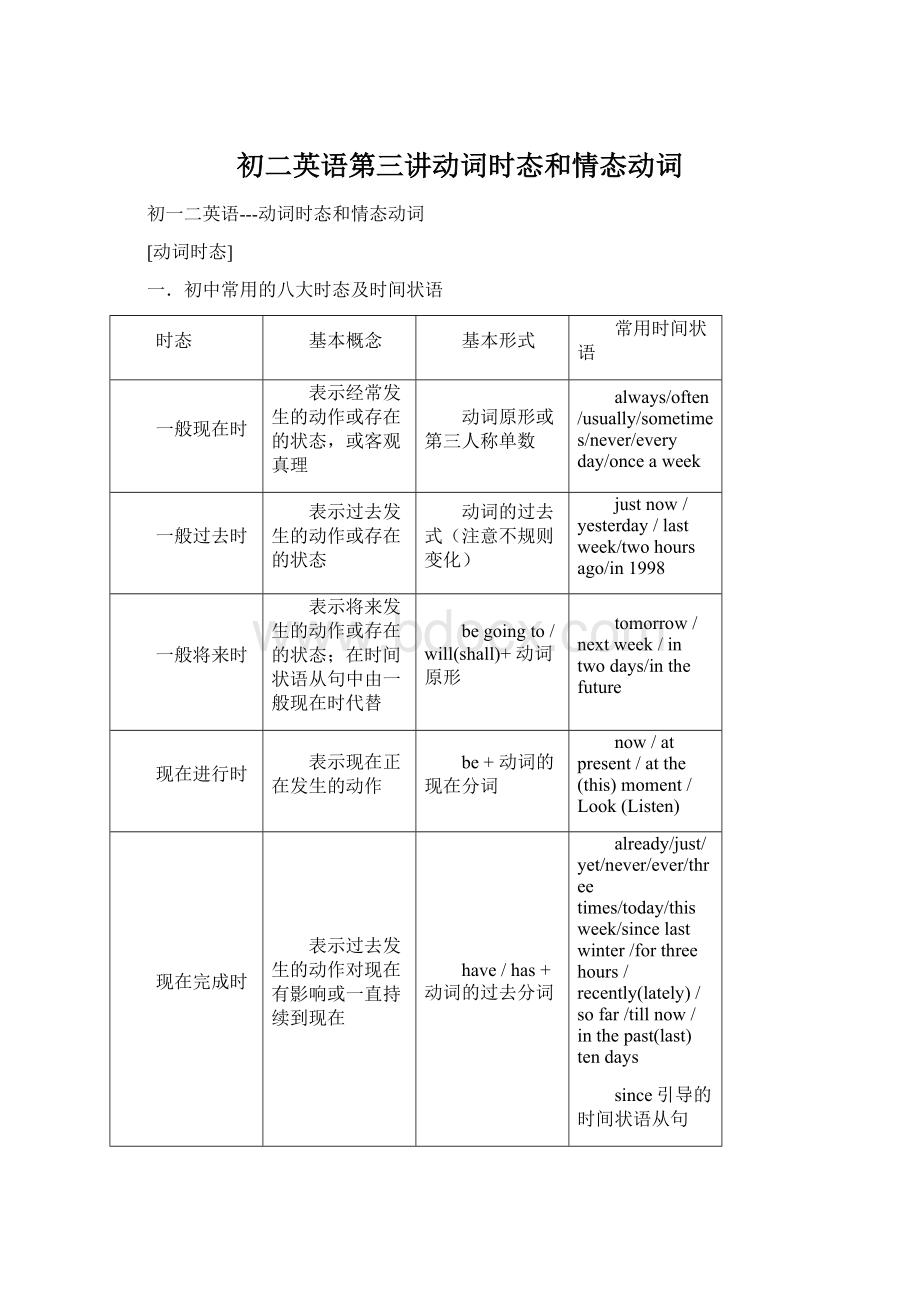 初二英语第三讲动词时态和情态动词.docx
初二英语第三讲动词时态和情态动词.docx
- 文档编号:7547035
- 上传时间:2023-01-24
- 格式:DOCX
- 页数:11
- 大小:21.85KB
初二英语第三讲动词时态和情态动词.docx
《初二英语第三讲动词时态和情态动词.docx》由会员分享,可在线阅读,更多相关《初二英语第三讲动词时态和情态动词.docx(11页珍藏版)》请在冰豆网上搜索。

初二英语第三讲动词时态和情态动词
初一二英语---动词时态和情态动词
[动词时态]
一.初中常用的八大时态及时间状语
时态
基本概念
基本形式
常用时间状语
一般现在时
表示经常发生的动作或存在的状态,或客观真理
动词原形或第三人称单数
always/often/usually/sometimes/never/everyday/onceaweek
一般过去时
表示过去发生的动作或存在的状态
动词的过去式(注意不规则变化)
justnow/yesterday/lastweek/twohoursago/in1998
一般将来时
表示将来发生的动作或存在的状态;在时间状语从句中由一般现在时代替
begoingto/will(shall)+动词原形
tomorrow/nextweek/intwodays/inthefuture
现在进行时
表示现在正在发生的动作
be+动词的现在分词
now/atpresent/atthe(this)moment/Look(Listen)
现在完成时
表示过去发生的动作对现在有影响或一直持续到现在
have/has+动词的过去分词
already/just/yet/never/ever/threetimes/today/thisweek/sincelastwinter/forthreehours/recently(lately)/sofar/tillnow/inthepast(last)tendays
since引导的时间状语从句
过去进行时
表示过去某一时刻或某一段时间正在发生的动作
was/were+动词的现在分词
atthatmoment/atthistimeyesterday/justthen/at6:
00lastSunday/from1:
00to3:
00yesterdayafternoon
when/while引导的时间状语从句中
过去完成时
表示在过去某一时间或动作之前已经完成的动作
had+动词的过去分词
bytheendoflastmonth/
Bythetime+时间状语从句(从句用过去时)
原因状语从句、宾语从句和让步状语从句中
过去将来时
表示从过去某一时间看将要发生的动作或存在的状态
would/was(were)goingto+动词原形
thenextday
主句是过去时态的宾语从句中
二.动词时态中的常见问题
1.不用进行时的动词
1)事实状态的动词(如:
have,belong,cost,weigh,continue)
Ihavetwobrothers.
Thishousebelongstomysister.
2)心理状态的动词(如:
know,realize,thinksee,believe,agree,remember,want,need,forget,prefer,mean,understand,love,hate)
Ineedyourhelp.
Helovesherverymuch.
3)瞬间动词(如:
receive,complete,finish,give,allow,decide)
Iacceptyouradvice.
Hedidn’tallowmetogoout.
4)部分系动词(如:
seem,see,hear,smell,feel,taste,become,turn)
Youseemalittletired.
Itlookslikeaball.
2.可以用几种时态表示将来发生的动作
1)下列动词:
come,go,arrive,leave,start,begin,return的一般现在时表将来,主要用来表示在时间上已确定或安排好的事情。
Thetrainleavesatsixtomorrowmorning.
Whendoesthebusstart?
Itstartsintenminutes.
2)下列动词:
come,go,start,arrive,leave,stay,takeoff,flyto…的现在进行时表将来,主要用来表示人的意图、打算、安排。
I'mleavingtomorrow.
Areyoustayingheretillnextweek?
3)在时间或条件状语从句中用一般现在时代替将来时
WhenBillcomes(不是willcome),askhimtowaitforme.
I'llwritetoyouassoonasIarrivethere.
4)在倒装句中用一般现在时表示动作正在进行或即将发生。
Herecomesthebus.(车要来了)
Theregoesthebell.(上课铃响了)
5)渐变动词,如:
get,run,grow,become,及die的现在进行时表示将来,主要用来表示即将发生的事。
Heisdying.他快要死了。
Itisgettingcolderandcolder.天变得越来越冷了。
3.一般过去时和现在完成时的区别
1)过去时表示过去某时发生的动作或单纯叙述过去的事情,强调动作;现在完成时为过去发生的,强调过去的事情对现在的影响,强调的是影响。
2)过去时常与具体的时间状语连用,而现在完成时通常与模糊的时间状语连用,或无时间状语。
3)现在完成时可表示持续到现在的动作或状态,动词一般是延续性的,如live,teach,learn,work,study,know。
过去时常用的非持续性动词有come,go,leave,start,die,finish,become等。
Isawthisfilmyesterday.(强调看的动作发生过了。
)
Ihaveseenthisfilm.(强调对现在的影响,电影的内容已经知道了。
)
Whydidyougetupsoearly?
(强调起床的动作已发生过了。
)
ShehasreturnedfromParis. (她已从巴黎回来了。
)
Shereturnedyesterday.(她是昨天回来了。
)
HehasbeenintheLeagueforthreeyears.(在团内的状态可延续)
HejoinedtheLeaguethreeyearsago.
(三年前入团,joined为短暂行为。
)
4)有些时间状语,如thismorning,tonight,thismonth等,既可用于一般过去时,又可用于现在完成时,但所表达的意义有所不同。
用于现在完成时表示包括现在在内,而用于一般过去式则与现在无关。
IhavereadthisbookthisApril.(说话时仍然为四月。
)
IreadthisbookthisApril.(说话时四月份已过。
)
4.一般过去时和过去完成时的区别
1)一般过去式表示过去时间发生的动作或存在的状态,而过去完成时在过去某一时间或动作之前已完成的动作或状态,即"过去的过去"。
当强调过去某一动作发生在某一动作之前时,常用此时态。
Hehadfinishedhishomeworkbeforenineo'clock. 九点之前他已经完成了作业。
Hefinishedhishomeworkatnineo’clock.在九点时他完成了作业。
2)实际上,一般现在时和过去完成时常搭配使用。
Whenhegothome,hisdaughterhadalreadygonetobed.
Hesaidhehadworkedthereforalongtime.
3)句中有by引导的时间状语从句时,动词可以单独用过去完成时,但是表示状态时仍用一般过去时。
Bytheendoflastyear,hehadalreadygothisdoctor’sdegree.
BylastSeptemberIwasalready18yearsold.
5.瞬间动词与延续动词的区别和转换
动词按其动作发生的方式、发生过程的长短可分为持续动词与瞬间动词。
延续动词表示能够延续的动作,如:
learn,work,stand,lie,know,walk,keep,have,wait,watch,sing,read,sleep,live,stay等。
可以与表示时间段的状语连用,如:
for+一段时间;since从句;since+时间点名词;howlong;foralongtime等。
瞬间动词也称终止性动词、非延续性动词,表示不能延续的动作,这种动作发生后立即结束。
如:
open,die,close,begin,finish,come,go,move,borrow,lend,buy等。
在肯定句中与表示时间点的状语连用。
1)用于完成时的区别
延续动词表示经验、经历;瞬间动词表示行为的结果,不能与表示段的时间状语连用。
Hehascompletedthework. 他已完成了那项工作。
(表结果)
I'veknownhimsincethen. 我从那时起就认识他了。
(表经历)
2)用于till/until从句的差异
延续动词用于肯定句,表示"做……直到……"。
瞬间动词用于否定句,表示"到……,才……"。
Hedidn'tcomebackuntilteno'clock.他到10点才回来。
Hesleptuntilteno'clock. 他一直睡到10点。
3)瞬间动词与延续动词的转换
leave---beaway,borrow---keep,buy---have,begin/start---beon,die---bedead,finish---beover,join---bein+组织机构/beamemberof+组织机构,
opensth---keepsthopen,fallill---beill,catchacold---haveacold,
comehere---behere,gothere---bethere,become---be,comeback---beback,fallasleep---beasleep,getto/arrive/reach---be(in),leave---beawayfrom,
Theoldmandied4yearsago.----Theoldmanhasbeendeadfor4years.
----Itis4yearssincetheoldmandied.
----Fouryearshaspassedsincetheoldmandied.
HejoinedtheParty2yearsago.-----HehasbeeninthePartyfor2years.
Iboughtthebook5daysago.----Ihavehadthebookfor5days.
6.用现在完成时的句型
1)Itisthefirst/secondtime….that…结构中的从句部分,用现在完成时。
ItisthefirsttimethatIhavevisitedthecity.
Itwasthethirdtimethattheboyhadbeenlate.
2)Thisisthe…that…结构,that从句要用现在完成时.
ThisisthebestfilmthatI've(ever)seen.这是我看过的最好的电影。
Thisisthefirsttime(that)I'veheardhimsing. 这是我第一次听他唱歌。
Greatmindsthinkalike.
Ⅰ.Choosethebestanswer.
1.Both his parents look sad.Maybe they _________what's happened to him.
A. knew B. haveknown C. mustknow D.willknow
2.He has _______been to Shanghai,has he?
A. already B.never C.ever D.still
3.There__________ameetingtomorrowafternoon.
A.willbegoingtoB.willgoingtobe
C.isgoingtobeD.willgotobe
4.Charlie________herenextmonth.
A.isn’tworkingB.doesn’tworking
C.isn’tgoingtoworkingD.won’twork
5.Have you met Mr.Li______?
A. just now B. ago C.before D. amomentago
6.HarryPotterisaverynicefilm.I_______ittwice.
A. will see B. have seen C. saw D.see
7.—These farmers have been to the United States.
—Really?
When_____ there?
A.will they go B. did they go
C. do they go D. have they gone
8.Listen!
Thebaby_____inthenextroom.
A.cryingB.criedC.iscryingD.cries
9.Look!
Thetwins_____newsweaters.
A.arewearingB.wearingC.arewearD.iswearing
10.Don’ttalkhere.Grandparents_____.
A.issleepingB.aresleepingC.sleepingD.sleep
11.—______you___your homework yet?
—Yes.I_____ it a moment ago.
A. Did;do;finished B. Have;done;finished
C. Have;done;have finished D. will;do;finish
12.—Howlonghaveyou ____here?
—Abouttwomonths.
A. been B. gone C. come D. arrive
13.He________verybusythisweek,he________freenextweek.
A.willbe;isB.is;is
C.willbe;willbeD.is;willbe
14.There________adolphinshowinthezootomorrowevening.
A.wasB.isgoingtohave
C.willhaveD.isgoingtobe
15.-----________you________freetomorrow?
-----No.I________freethedayaftertomorrow.
A.Are;goingto;willB.Are;goingtobe;will
C.Are;goingto;willbeD.Are;goingtobe;willbe
16.Mymother________meanicepresentonmynextbirthday.
A.willgivesB.willgive
C.givesD.give
17.----ShallIbuyacupofteaforyou?
-----________.
A.No,youwon’t.B.No,youaren’t.
C.No,thanks.D.No,please.
18.I_____thatyou_____goodcareofherthatday.
A.thought…willtakeB.thought…wouldtake
C.think…willtakeD.think…wouldtake
19.Theboys__________onlytwosubjectslastterm,butthistermthey__________five.
A.have,have B.had,had C.had,haveD.havehad,have
20.Theystoppedherebecausethey__________thewaytothestation.
A.didn’tknowB.don’tknowC.willknowD.weren’tknown
21.----Whereisthemorningpaper?
----I________itforyouatonce.
A.getB.amgetting
C.togetD.willget
22.________aconcertnextSaturday?
A.TherewillbeB.Willtherebe
C.TherecanbeD.Thereare
23.Iftheycome,we________ameeting.
A.haveB.willhave
C.hadD.wouldhave
24.He________herabeautifulhatonhernextbirthday.
A.givesB.gave
C.willgivingD.isgoingtogive
25.It’seighto’clocknow.Thestudents_____anEnglishclass.
A.haveB.havingC.ishavingD.arehaving
26.Tomisaworker.He_____inafactory.Hissisters_____inahospital.
A.work/workB.works/workC.work/works
27.Who_____Englishbestinyourclass?
A.speakB.speaksC.speaking
28.He________tousassoonashegetsthere.
A.writesB.haswritten
C.willwriteD.wrote
29.He________inthreedays.
A.comingbackB.cameback
C.willcomebackD.isgoingtocomingback
30.Who_____overtherenow?
A.singingB.aresingC.issingingD.sing
31.Mrs.Read_____thewindowseveryday.
A.iscleaningB.cleanC.cleans
32.We_____musicandoften_____tomusic.
A.like/listenB.likes/listensC.like/arelistening
33.Ifit________tomorrow,we’llgoroller-skating.
A.isn’trainB.won’train
C.doesn’trainD.doesn’train
34.----WillhisparentsgotoseetheTerraCottaWarriorstomorrow?
----No,________(不去).
A.theywilln’t.B.theywon’t.
C.theyaren’t.D.theydon’t.
35.She_____upatsixinthemorning.
A.getB.getsC.getting
36.OnSundayshesometimes_____hisclothesandsometimes_____someshopping.
A.wash/doB.iswashing/isdoingC.
- 配套讲稿:
如PPT文件的首页显示word图标,表示该PPT已包含配套word讲稿。双击word图标可打开word文档。
- 特殊限制:
部分文档作品中含有的国旗、国徽等图片,仅作为作品整体效果示例展示,禁止商用。设计者仅对作品中独创性部分享有著作权。
- 关 键 词:
- 初二 英语 第三 动词 时态 情态
 冰豆网所有资源均是用户自行上传分享,仅供网友学习交流,未经上传用户书面授权,请勿作他用。
冰豆网所有资源均是用户自行上传分享,仅供网友学习交流,未经上传用户书面授权,请勿作他用。


 铝散热器项目年度预算报告.docx
铝散热器项目年度预算报告.docx
